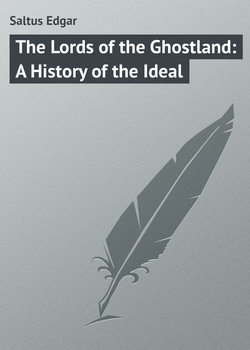The Lords of the Ghostland: A History of the Ideal

Реклама. ООО «ЛитРес», ИНН: 7719571260.
Оглавление
Saltus Edgar. The Lords of the Ghostland: A History of the Ideal
I. BRAHMA
II. ORMUZD
III. AMON-RÂ
IV. BEL-MARDUK
V. JEHOVAH
VI. ZEUS
VII. JUPITER
VIII. THE NEC PLUS ULTRA
Отрывок из книги
THE ideal is the essence of poetry. In the virginal innocence of the world, poetry was a term that meant discourse of the gods. A world grown grey has learned to regard the gods as diseases of language. Conceived, it may be, in fevers of fancy, perhaps, originally, they were but deified words. Yet, it is as children of beauty and of dream that they remain.
"Mortal has made the immortal," the Rig-Veda explicitly declares. The making was surely slow. In tracing the genealogy of the divine, it has been found that its root was fear. The root, dispersed by light, ultimately dissolved. But, meanwhile, it founded religion, which, revealed in storm and panic, for prophets had ignorance and dread. The gods were not then. There were demons only, more exactly there were diabolized expressions invented to denominate natural phenomena and whatever else perturbed. It was in the evolution of the demoniac that the divine appeared. Through one of time's unmeasurable gaps there floated the idea that perhaps the phenomena that alarmed were but the unconscious agents of superior minds. At the suggestion, irresistibly a dramatization of nature began in which the gods were born, swarms of them, nebulous, wayward, uncertain, that, through further gaps, became concrete, became occasionally reducible to two great divinities, earth and sky, whose union was imagined – a hymen which the rain suggested – and from which broader conceptions proceeded and grander gods emerged.
.....
To those who believe in the Dalai Lama – there are millions that have believed, there are millions that do – he is not a vicar of the divine, he is himself divine, a god in a tenement of flesh who, as such, though he die, immediately is reincarnated; a god therefore always present among his people, whose history is a continuous gospel. In contemporaneous Italy, a peasant may aspire to the papacy. In the uplands of Asia, men have loftier ambitions. There they may become Buddha, who perhaps never was, except in legend.
In the Lalita Vistâra the legend unfolds. In the strophes of the poem one may assist at the Buddha's birth, an event which is said to have occurred at Kapilavastu. Oriental geography is unacquainted with the place. With the thing even Occidental philosophy is familiar. Kapilavastu means the substance of Kapila. The substance is atheism.
.....